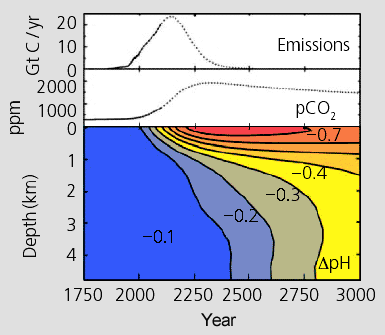“Out of sight, out of mind,” is a pithy saying that aptly sums up the attitude most industrialized countries have toward ocean acidification. While there has been much (justified) hand-wringing about the terrestrial impacts of climate change, policymakers have largely ignored the threats posed by acidic seas – which are considerable.
For one, ocean acidification could wipe out a significant fraction of the world’s coral reefs – perhaps even all of them – by mid-century if we don’t curb our emissions. In late 2007, 17 marine biologists co-authored a review article in Science in which they warned that, under a worst-case emissions scenario (450 – 500 ppm and a temperature increase larger than 5.4°C), all reefs could disappear, taking up to half of all marine life with them.
Also, by inhibiting the formation of calcium carbonate shells or skeletons in phytoplankton, depressed pH levels would significantly reduce the oceans’ ability to act as a sink for carbon dioxide.
Despite the growing clamor among scientists, no steps have yet been taken to make ocean acidification a key component of future climate negotiations. At last week’s World Oceans Conference in Manado, Indonesia, delegates from 76 countries met to discuss the deplorable state of ocean and coastal areas and to draft a resolution urging the international community to put ocean acidification on the agenda of December’s Copenhagen climate meeting.
Many of these delegates represented islands and developing countries, which have the most to lose from rising sea levels and acidic waters. Couple these problems with other anthropogenic impacts, including pollution, coastal development and overfishing, and you have the makings of an imminent catastrophe.
The election of the pro-environment Obama administration gave many hope that the United States would reclaim the mantle of global leadership and push for an ambitious successor to the Kyoto Protocol. In particular, the appointment of Jane Lubchenco, a renowned marine ecologist, as President Obama’s NOAA administrator heartened many scientists concerned about the lack of focus on the oceans.
The administration’s environmental credentials are about to be put to the test, thanks to a new lawsuit filed last Friday by the Tucson, Arizona, based Center for Biological Diversity. The non-profit group is suing the EPA over its failure to acknowledge the impacts of ocean acidification on Washington’s coastal waters.
More specifically, it wants the EPA to add any waters that fail to meet federal water quality standards because of ocean acidification to its impaired list if a state does not act. When a water body is added to the list, the EPA or the state has to set limits on the amount of pollutants entering the system; in this case, it would mean reducing emission production.
Billed as the first case to tackle ocean acidification, it will test whether the reach of the Clean Water Act, under whose auspices the lawsuit was brought, extends to the regulation of carbon dioxide as a pollutant. Current EPA guidelines dictate that waters be placed on the impaired list if their pH deviates by 0.2 or more units.
A report published last year in the Proceedings of the National Academy of Sciences determined that the pH of Washington’s coastal waters had dropped by more than 0.2 units since 2000. Despite this, the EPA did not add Washington’s waters to its impaired list when it approved the state’s list earlier this year. The CBD had previously raised concerns during the list’s public comment period.
In recent months, the EPA has shown signs that it may be warming to the CBD’s position, initiating a public process to review its water quality criteria and invoking the Act to request more data on ocean acidification. Therefore, there is a good chance the lawsuit could force the EPA’s hand a bit and give the U.S. its first regulations for ocean acidification.
Subscribe to our newsletter
Stay up to date with DeSmog news and alerts






